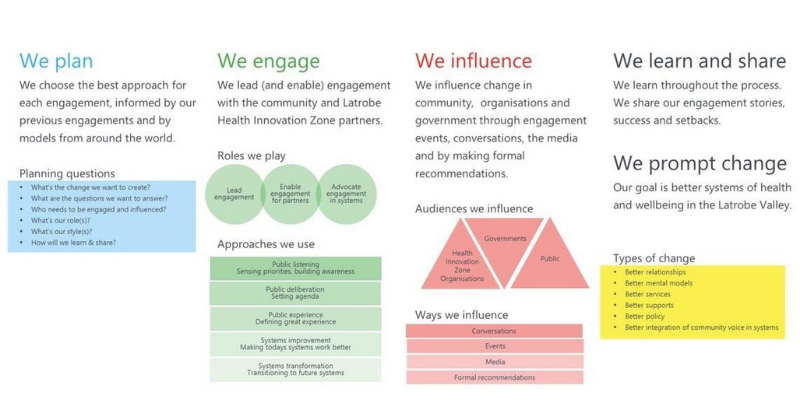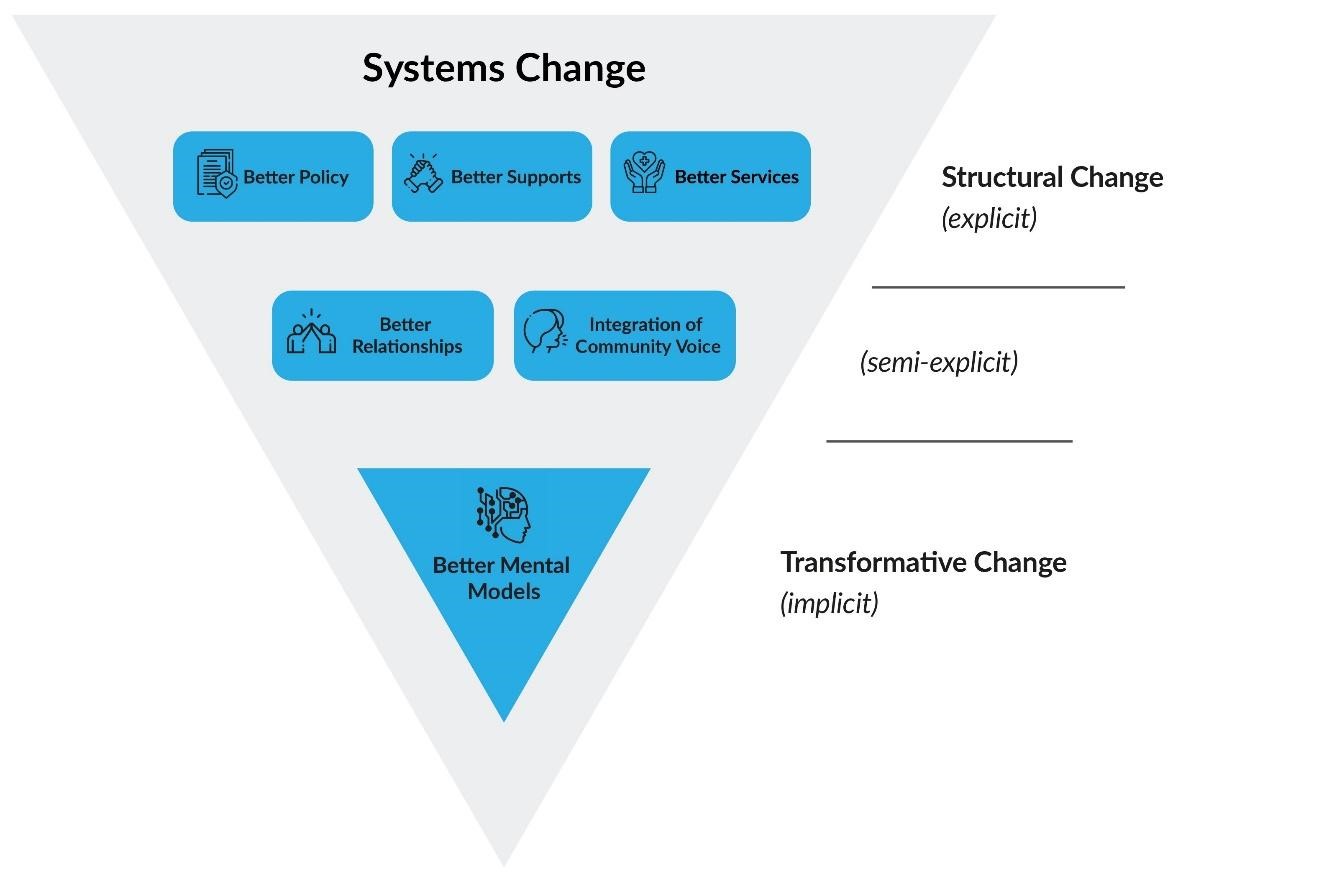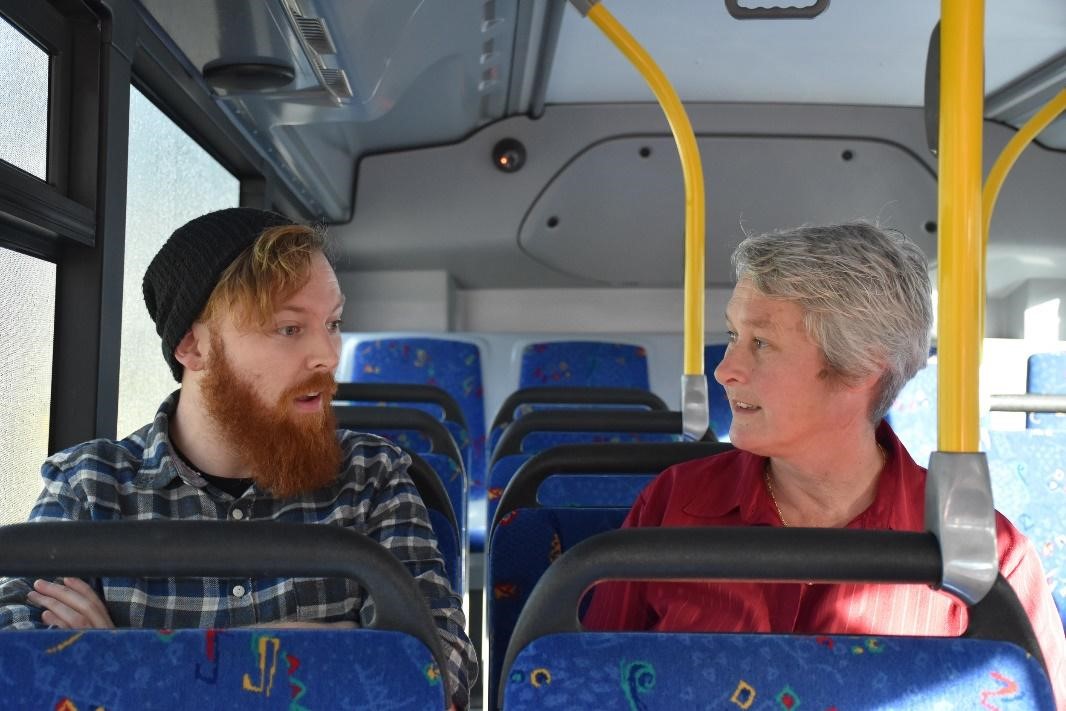

Centring community voices for improved health outcomes in Australia’s Latrobe Valley
Article highlights
.@LHAdvocate provides independent advice to @VicGovAu on behalf of Latrobe Valley communities on system & policy issues affecting health & wellbeing. Read her story in this @CPI_foundation article
Share article.@LHAdvocate & team engage, influence & prompt change: "we engage w/ a range of communities, and in doing so we listen to & elevate the voices of people who may not otherwise be heard"
Share article"As part of our Human Connections project, my office has developed a unique & effective way of seeking out & hearing the views of people who live, work and study in Latrobe" @LHAdvocate on the power of community voices
Share articlePartnering for Learning
We put our vision for government into practice through learning partner projects that align with our values and help reimagine government so that it works for everyone.
The Hazelwood mine fire of 2014 was the largest and longest burning coal mine fire that has ever occurred in the Latrobe Valley, the centre of Victoria’s energy industry, east of Melbourne, Australia. For 45 days, Morwell and surrounding towns were blanketed with smoke and ash as the blaze raged out of control. It was a major fire emergency and public health risk.
The subsequent Hazelwood Mine Fire Inquiry 2014 found the health profile of the Latrobe Valley is poorer compared to other local government areas in Victoria. It established that there was a strong case for the health of the Latrobe Valley to be substantially improved. In light of these findings, a number of actions were recommended to improve service coordination and health outcomes in the Latrobe Valley, including;
Appointment of a Latrobe Health Advocate
Establishment of the Latrobe Health Assembly
Designation of the Latrobe Health Innovation Zone
I was appointed as the Latrobe Health Advocate by the Minister for Health in May 2018. The first-of-its-kind in Australia, my role is to provide independent advice to the Victorian Government on behalf of Latrobe Valley communities on system and policy issues affecting their health and wellbeing. I provide community wide leadership by enabling, mediating and advocating for health improvements through health and broader system improvements and change.
The role of the Advocate is a key mechanism of the Latrobe Health Innovation Zone, which is designed to give voice to community aspirations in the planning and delivering of better health and wellbeing outcomes, and where a process of co-design with individuals and organisations is actively encouraged.
We are a small team of four people with diverse skill sets at the Advocate’s office. I am joined by a Senior Advisor, Office Coordinator, and Communications and Engagement Officer. Our size affords us great flexibility and the freedom to establish a unique, collaborative way of working that we are constantly reviewing and building on. While I was appointed by the Victorian Minister for Health and assigned a framework, my team has designed its own operating, research and engagement models.

My office has developed a reputation as a trusted independent source for the people of Latrobe, and our engagement model (above), which was co-designed with Latrobe communities, is centred on three principles:
We engage: An essential part of my job is to listen to and understand the views and needs of people in Latrobe. For me, the only way to do this is to first understand how people in Latrobe want to have their voice and what is important to them. In particular, people who – for a range of reasons – may be experiencing disadvantage, people who may not have their voices heard, or people who may not recognise the value of their voice.
We influence: We identify immediate actions and longer-term aspirations and work to improve current systems and transition to new systems. We connect stakeholder into community and build community sensitivity to the genuine constraints of the system.
We prompt change: We advocate on behalf of Latrobe communities for systems change to improve health and wellbeing. Adapted from the Water of Systems Change model, our systems change model (below) is focused on achieving; better policies, better supports, better services, better relationships, integration of community voice and better mental models.

To manage and monitor our engagement with community and inform our projects, we use a stakeholder engagement platform called Consultation Manager. We enter, extract, analyse, and interpret the qualitative data gained through our engagements, activities and community conversations and generate insights about the needs, concerns and aspirations of Latrobe communities.
These insights are used to generate monthly reports to the Minister for Health, and quarterly reports which are provided to government, services, stakeholders and community. They are also used to produce formal recommendations for government and services to address gaps in the local system. Within our communication methods, we commonly share quotes from community conversation by way of speech bubbles to provide both genuineness and authenticity, acknowledgement of what we have heard and motivation for change.

My office engages with a diverse range of communities, and in doing so we listen to and elevate the voices of people who may not otherwise have their voices heard. Based on our engagements we develop Engagement Inspiration reports, which include key insights and suggestions for governments and services about how people in Latrobe want to engage and what matters to them. Over the last three years we have heard and are hearing from;
People living with disabilities
People living with chronic illness
People from multicultural backgrounds
Aboriginal and Torres Strait Islander People
LGBTIQ people
People experiencing financial stress
Young people aged 12-25
Older people aged 60 and over
We also identify and embark on priority projects that directly address the health and wellbeing concerns, aspirations and needs of the people we meet. To date we have focused on;
Access to services
Palliative care
Mental health
Healthy lifestyles
Human connections
As part of our Human Connections project, my office has developed a unique and effective way of seeking out and hearing the views of people who live, work and study in Latrobe. In December 2018, I decided to board local buses in a bid to connect with people and strike up meaningful conversations about their health and wellbeing concerns and aspirations. The On the Buses initiative has become a regular engagement activity and has enabled me to truly hear the voices of people who may otherwise not have a voice. People don’t always recognise the power of their voice or the value in what they have to say.

Over the last three years, there have been many instances where integration of community voice has affected real and powerful systems change. I was recently approached by a community member who came to me with concerns about the language used in the promotion of cancer screening services. As a transgender man, this person felt there was a need for messages about breast screening to be more inclusive of the LGBTIQ+ community and contain images other than those of female-presenting people. My office facilitated collaborative discussions with the Gippsland Primary Health Network (GippslandPHN), Breast Screen Victoria and Cancer Council Australia and as a result a number of LGBTIQ+ people are now working directly with services to share their ideas and provide feedback. Screen For Me, an initiative of the GippslandPHN, is now working to incorporate more inclusive messages and images in their promotional material.
Reaching out to the community, truly hearing from people and learning about ways to successfully engage them has become the cornerstone of all our work. We engage with purpose and a willingness to listen openly. As a result of this my office is a referral point for people to come and talk about their health and wellbeing concerns, and local services look to us a trusted source of information and insight.
Establishing an office and an independent way of working has not been without its challenges. While there has been a willingness from services to listen to the concerns of community, we need to build the capacity of those in the service system to respond to these concerns. This requires both time and skill. It is a skill to hear from someone in the community, listen openly and truly take their feedback on board. We need to listen, but we also need to build expectation that is commensurate with the system’s ability to respond.
As I look ahead I am optimistic about the opportunities that exist to truly integrate community voice with the decision making processes and day to day activities of government and services. My office welcomes the opportunity to learn from others, to strengthen the work we are doing and to build on the collective knowledge that exists here in Latrobe Valley and beyond.
Written by:
You may also be interested in...


Nobody Left Behind: solutions for the community, by the community
